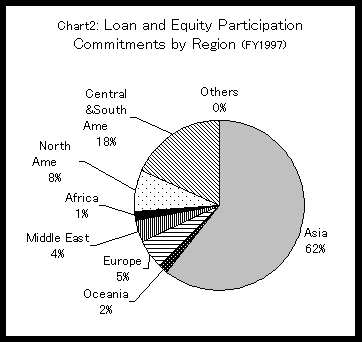Japan Bank of International Cooperation, (JBIC)
(former JEXIM: Export-Import Bank of Japan)
Japan Bank of International Cooperation (JBIC) is the world's largest source of development finance, with an annual budget of over 3 trillion yen (approx. US 27 billion dollars). It was established in September 1999 by the merger of Export-Import Bank of Japan (JEXIM) and the Overseas Economic Cooperation Fund (OECF). Thus, presently International Finance Operations of the JBIC have functions of an ECA, while Overseas Economic Cooperation Operations are to provide ODA loans.
Functions & Roles of the IFO/JBIC (former JEXIM)
International Finance Operations of the JBIC provides loans and guarantees to (1) support exports of plants and equipment from Japan (2) improve base for Japanese investments (3) secure natural resources to Japan and (4) support international financial order. For such purposes, the JBIC keeps financing large destructive infrastructure and resource development projects. Types of loans that the IFO/JBIC provides include:
Export Loans
Import Loans
Overseas Investment Loans
Untied Loans
In FY1997, JEXIM made ¥1,997 billion (at US$1 = 120 yen, equal to $16.6 billion) in Loan and Equity Participation Commitments, ¥1,892 billion ($15.7 billion) of disbursements and ¥81.6 billion ($680 million) in guarantees. A large portion of the Bank's loans goes to Asia.

The JEXIM has been increasing the amount and percentage of overseas investment loans and untied loans in the last decade. Compared to FY1985, overseas investment loans increased by 742%, most of which are Build/Operate/Transfer (BOT), and untied loans increased by 490%. After the Asian financial crisis, the JBIC is playing a more significant roles in Asia. The amount directed to the region escalated noticeably in 1997 with ¥1,284.1 billion ($10.7 billion), which is a 185% increase over the previous year. Taking this occasion of the merger, JEXIM guarantees debts of public bonds issued by foreign governments. Also, it will be able to take over bonds of private banks when they withdraw from overseas projects co-financed by those banks and JBIC. It aims at helping implementation of overseas projects by securing financing. These new functions that JEXIM plans to take are provoking arguments in Japan over the conversion of private debts by public money.
JBIC Environmental Guidelines
While the OECF set environmental guidelines for ODA loan operations for the first time in 1989, JEXIM has had no guidelines until September 1999. Instead, projects were reviewed with respect to items on a cursory ‘environmental checklists’ which had far lower standard than the OECF operations.
The JEXIM set environmental guidelines and published it for the first time at the opportunity of the merger with OECF. This guidelines are going to be revised when common guidelines to cover both of ODA and non-ODA operations of the JBIC are set. Work to set the new guidelines that "comply with international standards" is expected to start soon, with the participation of NGOs and academics.
See also NGO comments on the
JEXIM guidelines
See also JBIC homepage

